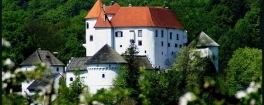The Ensemble Diatessaron, from San Sebastián, in the Basque Country, is composed of artists who specialise in playing the 16th to 18th century repertoire with original instruments. Its name refers to one of the characteristic intervals of early music, the perfect fourth. The band members share an interest in experimentation and search of new avenues in which to bring historical interpretation alive and relevant to the present time. They believe that music is a universal language, which crosses frontiers and centuries to touch the deepest and most direct parts of the human soul.

Ticket order:
5 / 20 / 25 EUR
Access: transport 18:10 - Ljubljana - Velenje - Ljubljana (10,00 EUR)
Ensemble Diatessaron
Elena Martínez de Murguía (viola da gamba)
Rafael Bonavita (theorbo, baroque guitar)
Musika Loreak – Musical Flowers
The Basque messenger: An encounter between cultures in the Europe of kings
The program includes works by the great masters and virtuosos of the baroque guitar, theorbo and viola da gamba. The music flourished in the courts of kings, who had musicians working in their courts and had music playing at every occasion. The musicians travelled to and fro, carrying with them rhythms and melodies inspired by the inexhaustible source of the popular music, thereby making music a vehicle of communication and beauty.
Artist message
We have taken the title Musical Flowers from a collection by Martin y Coll, which reflects many types of songs that were fashionable and that shaped the Europe of the time. We like it because it displayed a way to make music: melodies were borrowed, rhythms were copied, enriching and changing the music according to the time and place. It is very nice to see that the same song was known and used in different countries. Variations appeared, the so-called "floreaba", which means free ornamentation. Since we identify with this creative spirit, we travel and wish to show that we are more alike than different, driven by the same energy and that we enrich each other.
About the project
The borders of the vast Habsburg empire separated not only politically but also and especially culturally. With splendour in the arts, the ruling monarch could present his influence and power in all areas of life - from politics to music. The Habsburg emperors as major sponsors of artists and composers greatly enriched the European culture.
The Concilium Musicum Wien, special ensemble on period instruments, and the soprano Heidi Manser invite to the Habsburg court and bring the splendour of past centuries to our times. Besides the “Styrian Bach” Johann Joseph Fux and Maria Theresa’s piano teacher Georg Christoph Wagenseil, also compositions of crowned heads will be heard: Leopold I and Joseph I convince as first-class composers.
Event programme
Marin Marais (1656 - 1728)
Le Basque
(Pièces de violes, 4ème livre, Paris 1717)
Marin Marais (1656 - 1728)
Folies d’Espagne
Couplets de folies
(Pièces de violes, 2ème livre, Paris 1701)
Giovanni Girolamo Kapsberger (ca. 1580 -1651)
Tenore / Canario
(Libro primo, Venezia 1604)
Antonio Martin y Coll (1671 - 1734)
Marizápalos
(“Flores de Música”, Biblioteca Nacional de Madrid M-1357)
Francesco Corbetta (1615 - 1681)
Caprice de Chaconne
(La Guitarre Royalle, Paris 1670)
Diego Ortiz (ca. 1510 - 1570)
Recercadas
Recercadas sobre tenores, segunda / settima / qvarta / primera
(Tratado de Glosas, Roma 1553)
*** intermission 20 min ***
Anonymous (XVIII. cent.)
Air et Chanson de St. Jaques en couplets ou variations
(Manuscrit de Foix)
Anonymous (XVIII. cent.)
Lanchas para baylar
(Codex Martinez Compañón, Peru)
Robert De Visée (ca. 1650 - ca. 1725)
Prèlude et Chaconne
(Manuscript Vaudry de Saizenay, Besançon ca. 1699)
Populares, MªAntonia Moyua (XVIII. cent., Zortziko)
Ormatxulo, Donostiako hiru damatxo, Zortziko, Belaun Txingoa, Pelegria naizela
(Aita Donostia, Iztueta. XIX.-XX. cent.)
Marin Marais (1656 - 1728)
Grand Ballet
(Pièces de violes, 3ème livre, Paris 1711)
Velenje, Velenje Castle

The Velenje Castle is one of the most beautiful castles in Slovenia. Historical texts first mention it in 1270.









